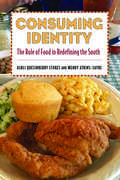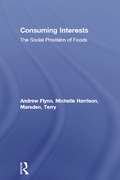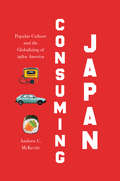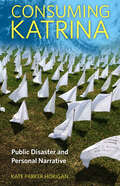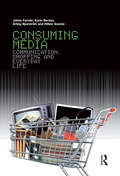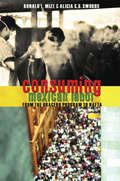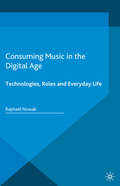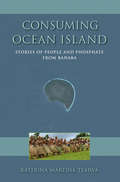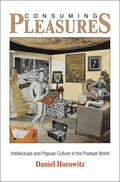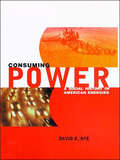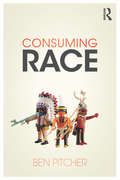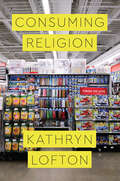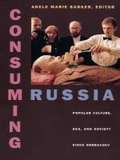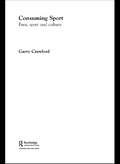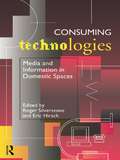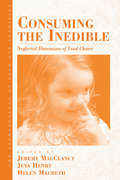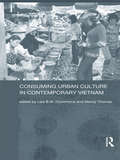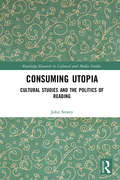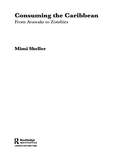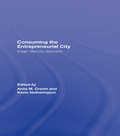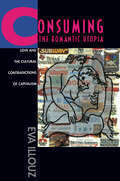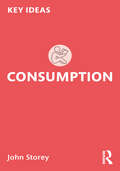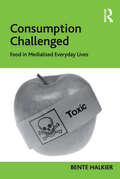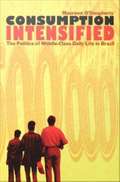- Table View
- List View
Consuming Identity: The Role of Food in Redefining the South (Race, Rhetoric, and Media Series)
by Ashli Quesinberry Stokes Wendy Atkins-SayreSoutherners love to talk food, quickly revealing likes and dislikes, regional preferences, and their own delicious stories. Because the topic often crosses lines of race, class, gender, and region, food supplies a common fuel to launch discussion. Consuming Identity sifts through the self-definitions, allegiances, and bonds made possible and strengthened through the theme of southern foodways. The book focuses on the role food plays in building identities, accounting for the messages food sends about who we are, how we see ourselves, and how we see others. While many volumes examine southern food, this one is the first to focus on food’s rhetorical qualities and the effect that it can have on culture.The volume examines southern food stories that speak to the identity of the region, explain how food helps to build identities, and explore how it enables cultural exchange. Food acts rhetorically, with what we choose to eat and serve sending distinct messages. It also serves a vital identity-building function, factoring heavily into our memories, narratives, and understanding of who we are. Finally, because food and the tales surrounding it are so important to southerners, the rhetoric of food offers a significant and meaningful way to open up dialogue in the region. By sharing and celebrating both foodways and the food itself, southerners are able to revel in shared histories and traditions. In this way individuals find a common language despite the divisions of race and class that continue to plague the South. The rich subject of southern fare serves up a significant starting point for understanding the powerful rhetorical potential of all food.
Consuming Interests: The Social Provision of Foods (Consumption And Space Ser.)
by Michelle Harrison Terry Marsden Andrew FlynnCombining theory, research and policy Consuming Interests provides a topical interdisciplinary exploration into the nature of food provision, policy and regulation. The book provides a detailed examination of corporate retailers, state agencies and consumer organisations involved in the food sector. The analysis explores questions including: * what can the public expect from the state* what limits are there on state action* what are the most appropriate balancesbetween public and private interests in the provision of 'quality' foods.
Consuming Japan: Popular Culture and the Globalizing of 1980s America (Studies in United States Culture)
by Andrew C. McKevittThis insightful book explores the intense and ultimately fleeting moment in 1980s America when the future looked Japanese. Would Japan's remarkable post–World War II economic success enable the East Asian nation to overtake the United States? Or could Japan's globe-trotting corporations serve as a model for battered U.S. industries, pointing the way to a future of globalized commerce and culture? While popular films and literature recycled old anti-Asian imagery and crafted new ways of imagining the "yellow peril," and formal U.S.-Japan relations remained locked in a holding pattern of Cold War complacency, a remarkable shift was happening in countless local places throughout the United States: Japanese goods were remaking American consumer life and injecting contemporary globalization into U.S. commerce and culture. What impact did the flood of billions of Japanese things have on the ways Americans produced, consumed, and thought about their place in the world? From autoworkers to anime fans, Consuming Japan introduces new unorthodox actors into foreign-relations history, demonstrating how the flow of all things Japanese contributed to the globalizing of America in the late twentieth century.
Consuming Katrina: Public Disaster and Personal Narrative (Folklore Studies in a Multicultural World Series)
by Dr. Kate Parker HoriganWhen and under what circumstances are disaster survivors able to speak for themselves in the public arena? In Consuming Katrina: Public Disaster and Personal Narrative, author Kate Parker Horigan shows how the public understands and remembers large-scale disasters like Hurricane Katrina, outlining which stories are remembered and why, as well as the impact on public memory and the survivors themselves.Horigan discusses unique contexts in which personal narratives about the storm are shared, including interviews with survivors, Dave Eggers's Zeitoun, Josh Neufeld's A.D.: New Orleans After the Deluge, Tia Lessin and Carl Deal's Trouble the Water, and public commemoration during Hurricane Katrina's tenth anniversary in New Orleans. In each case, survivors initially present themselves in specific ways, counteracting negative stereotypes that characterize their communities. However, when adapted for public presentation, their stories get reduced back to those stereotypes. As a result, people affected by Katrina continue to be seen in limited terms, as either undeserving or incapable of managing recovery.This project is rooted in Horigan's experiences living in New Orleans before and after Katrina, but it is also a case study illustrating an ongoing problem and an innovative solution: survivors' stories should be shared in a way that includes their own engagement with the processes of narrative production, circulation, and reception. When survivors are seen as agents in their own stories, they will be seen as agents in their own recovery. Having a better grasp on the processes of narration and memory is critical for improved disaster response because the stories that are most widely shared about disaster determine how communities recover.
Consuming Media: Communication, Shopping and Everyday Life
by Johan Fornäs Erling Bjurström Karin Becker Hillevi GanetzInspired by Walter Benjamin's classical Arcades Project, Consuming Media is a pioneering exploration of the interface between communication, shopping and everyday life. Based on a six-year study by over a dozen scholars on a specific site, it analyses the links between power, media and consumption in contemporary urban culture.Illustrated with rich ethnographic detail, Consuming Media scrutinises four main media circuits - print media, media images, sound and motion, and hardware machines - to assess how media texts and technologies are selected, purchased and used.Exploring the relations between different media, the nature of cultural citizenship and the power relations of public space, Consuming Media presents an ethnography of globalisation and develops a new approach to understanding media consumption.
Consuming Mexican Labor: From The Bracero Program To Nafta
by Ronald Mize Alicia SwordsMexican migration to the United States and Canada is a highly contentious issue in the eyes of many North Americans, and every generation seems to construct the northward flow of labor as a brand new social problem. The history of Mexican labor migration to the United States, from the Bracero Program (1942-1964) to the North American Free Trade Agreement (NAFTA), suggests that Mexicans have been actively encouraged to migrate northward when labor markets are in short supply, only to be turned back during economic downturns. In this timely book, Mize and Swords dissect the social relations that define how corporations, consumers, and states involve Mexican immigrant laborers in the politics of production and consumption. The result is a comprehensive and contemporary look at the increasingly important role that Mexican immigrants play in the North American economy.
Consuming Music in the Digital Age: Technologies, Roles and Everyday Life (Pop Music, Culture and Identity)
by Raphaël NowakThis book addresses the issue of music consumption in the digital era of technologies. It explores how individuals use music in the context of their everyday lives and how, in return, music acquires certain roles within everyday contexts and more broadly in their life narratives.
Consuming Ocean Island
by Katerina Martina TeaiwaConsuming Ocean Island tells the story of the land and people of Banaba, a small Pacific island, which, from 1900 to 1980, was heavily mined for phosphate, an essential ingredient in fertilizer. As mining stripped away the island's surface, the land was rendered uninhabitable, and the indigenous Banabans were relocated to Rabi Island in Fiji. Katerina Martina Teaiwa tells the story of this human and ecological calamity by weaving together memories, records, and images from displaced islanders, colonial administrators, and employees of the mining company. Her compelling narrative reminds us of what is at stake whenever the interests of industrial agriculture and indigenous minorities come into conflict. The Banaban experience offers insight into the plight of other island peoples facing forced migration as a result of human impact on the environment.
Consuming Pleasures
by Daniel HorowitzHow is it that American intellectuals, who had for 150 years worried about the deleterious effects of affluence, more recently began to emphasize pleasure, playfulness, and symbolic exchange as the essence of a vibrant consumer culture? The New York intellectuals of the 1930s rejected any serious or analytical discussion, let alone appreciation, of popular culture, which they viewed as morally questionable. Beginning in the 1950s, however, new perspectives emerged outside and within the United States that challenged this dominant thinking. Consuming Pleasures reveals how a group of writers shifted attention from condemnation to critical appreciation, critiqued cultural hierarchies and moralistic approaches, and explored the symbolic processes by which individuals and groups communicate.Historian Daniel Horowitz traces the emergence of these new perspectives through a series of intellectual biographies. With writers and readers from the United States at the center, the story begins in Western Europe in the early 1950s and ends in the early 1970s, when American intellectuals increasingly appreciated the rich inventiveness of popular culture. Drawing on sources both familiar and newly discovered, this transnational intellectual history plays familiar works off each other in fresh ways. Among those whose work is featured are Jürgen Habermas, Roland Barthes, Umberto Eco, Walter Benjamin, C. L. R. James, David Riesman and Marshall McLuhan, Richard Hoggart, members of London's Independent Group, Stuart Hall, Paddy Whannel, Tom Wolfe, Herbert Gans, Susan Sontag, Reyner Banham, and Robert Venturi and Denise Scott Brown.
Consuming Power: A Social History of American Energies (The\mit Press Ser.)
by David E. NyeNye uses energy as a touchstone to examine the lives of ordinary people engaged in normal activities.How did the United States become the world's largest consumer of energy? David Nye shows that this is less a question about the development of technology than it is a question about the development of culture. In Consuming Power, Nye uses energy as a touchstone to examine the lives of ordinary people engaged in normal activities. He looks at how these activities changed as new energy systems were constructed, from colonial times to recent years. He also shows how, as Americans incorporated new machines and processes into their lives, they became ensnared in power systems that were not easily changed: they made choices about the conduct of their lives, and those choices accumulated to produce a consuming culture. Nye examines a sequence of large systems that acquired and then lost technological momentum over the course of American history, including water power, steam power, electricity, the internal-combustion engine, atomic power, and computerization. He shows how each system became part of a larger set of social constructions through its links to the home, the factory, and the city. The result is a social history of America as seen through the lens of energy consumption.
Consuming Race
by Ben PitcherFrom the rise of Nordic noir to a taste for street food, from practices of natural gardening to the aesthetics of children's TV, contemporary culture is saturated with racial meanings. By consuming race we make sense of other groups and cultures, communicate our own identities, express our needs and desires, and discover new ways of thinking and being. This book explores how the meanings of race are made and remade in acts of creative consumption. Ranging across the terrain of popular culture, and finding race in some unusual and unexpected places, it offers fresh and innovative ways of thinking about the centrality of race to our lives. Consuming Race provides an accessible and highly readable overview of the latest research and a detailed reading of a diverse range of objects, sites and practices. It gives students of sociology, media and cultural studies the opportunity to make connections between academic debates and their own everyday practices of consumption.
Consuming Religion (Class 200: New Studies in Religion)
by Kathryn LoftonWhat are you drawn to like, to watch, or even to binge? What are you free to consume, and what do you become through consumption? These questions of desire and value, Kathryn Lofton argues, are questions for the study of religion. In eleven essays exploring soap and office cubicles, Britney Spears and the Kardashians, corporate culture and Goldman Sachs, Lofton shows the conceptual levers of religion in thinking about social modes of encounter, use, and longing. Wherever we see people articulate their dreams of and for the world, wherever we see those dreams organized into protocols, images, manuals, and contracts, we glimpse what the word “religion” allows us to describe and understand. With great style and analytical acumen, Lofton offers the ultimate guide to religion and consumption in our capitalizing times.
Consuming Russia: Popular Culture, Sex, and Society since Gorbachev
by Adele Marie BarkerWith the collapse of the Soviet empire in the late 1980s, the Russian social landscape has undergone its most dramatic changes since the Bolshevik Revolution in 1917, turning the once bland and monolithic state-run marketplace into a virtual maze of specialty shops--from sushi bars to discotheques and tattoo parlors. In Consuming Russia editor Adele Marie Barker presents the first book-length volume to explore the sweeping cultural transformation taking place in the new Russia. The contributors examine how the people of Russia reconcile prerevolutionary elite culture--as well as the communist legacy--with the influx of popular influences from the West to build a society that no longer relies on a single dominant discourse and embraces the multiplicities of both public and private Russian life. Barker brings together Russian and American scholars from anthropology, history, literature, political science, sociology, and cultural studies. These experts fuse theoretical analysis with ethnographic research to analyze the rise of popular culture, covering topics as varied as post-Soviet rave culture, rock music, children and advertising, pyramid schemes, tattooing, pets, and spectator sports. They consider detective novels, anecdotes, issues of feminism and queer sexuality, nostalgia, the Russian cinema, and graffiti. Discussions of pornography, religious cults, and the deployment of Soviet ideological symbols as post-Soviet kitsch also help to demonstrate how the rebuilding of Russia's political and economic infrastructure has been influenced by its citizens' cultural production and consumption. This volume will appeal to those engaged with post-Soviet studies, to anyone interested in the state of Russian society, and to readers more generally involved with the study of popular culture.Contributors. Adele Marie Barker, Eliot Borenstein, Svetlana Boym, John Bushnell, Nancy Condee, Robert Edelman, Laurie Essig, Julia P. Friedman, Paul W. Goldschmidt, Judith Deutsch Kornblatt, Anna Krylova, Susan Larsen, Catharine Theimer Nepomnyaschy, Theresa Sabonis-Chafee, Tim Scholl, Adam Weiner, Alexei Yurchak, Elizabeth Kristofovich Zelensky
Consuming Sport: Fans, Sport and Culture
by Garry CrawfordConsuming Sport offers a detailed consideration of how sport is experienced and engaged with in the everyday lives, social networks and consumer patterns of its followers. It examines the processes of becoming a sport fan, and the social and moral career that supporters follow as their involvement develops over a life-course.The book argues that while for many people sport matters, for many more, it does not. Though for some sport is significant in shaping their social and cultural identity, it is often consumed and experienced by others in quite mundane and everyday ways, through the media images that surround us, conversations overheard and in the clothing of people we pass by.As well as developing a new theory of sport fandom the book links this discussion to wider debates on audiences, fan cultures and consumer practices. The text argues that for far too long consideration of sport fans has focused on exceptional forms of support ignoring the myriad of ways in which sport can be experienced and consumed in everyday life.
Consuming Technologies: Media and Information in Domestic Spaces
by Roger Silverstone Eric HirschConsuming Technologies opens for analysis some crucial but rarely examined areas of social, cultural and economic life. At its core is a concern with the complex set of relationships that mark and define the place of the domestic in the modern world, and an explanation of the relationship between the domestic and public spheres as they are mediated by consumption and technology.
Consuming The Inedible
by Helen Macbeth Jeya Henry Jeremy M. MacclancyEveryday, millions of people eat earth, clay, nasal mucus, and similar substances. Yet food practices like these are strikingly understudied in a sustained, interdisciplinary manner. This book aims to correct this neglect. Contributors, utilizing anthropological, nutritional, biochemical, psychological and health-related perspectives, examine in a rigorously comparative manner the consumption of foods conventionally regarded as inedible by most Westerners. This book is both timely and significant because nutritionists and health care professionals are seldom aware of anthropological information on these food practices, and vice versa. Ranging across diversity of disciplines Consuming the Inedible surveys scientific and local views about the consequences - biological, mineral, social or spiritual - of these food practices, and probes to what extent we can generalize about them.
Consuming Urban Culture in Contemporary Vietnam
by Mandy Thomas Lisa B.W. DrummondVietnam is currently undergoing a metamorphosis from a relatively closed society with a centrally planned economy, to a rapidly urbanising one with a global outlook. These changes have been the catalyst for an exciting ferment of activity in popular culture. This volume contains contributions from scholars engaged in the most up-to-date social research in Vietnam, as well as some of Vietnam's most popular cultural producers who are forging new ways of imagining the present whilst at the same time engaging actively in reinterpreting the past. The diverse ways that Vietnam is culturally and socially negotiating the future are examined as the book addresses issues of indigenisation of cultural influences, ambivalence surrounding change, and the consistent blurring of boundaries between informal, non-state cultural activities and formal institutional structures in the evolution of a civil society in Vietnam.
Consuming Utopia: Cultural Studies and the Politics of Reading (Routledge Research in Cultural and Media Studies)
by John StoreyConsuming Utopia builds on critical insights into consumption and utopianism developed in two previous books by the author to elaborate what it means to read utopian fiction (including dystopian and anti-utopian) from the critical perspective of cultural studies. With a critical focus on social practices of reading rather than on the text itself, John Storey advances a timely and relevant contribution to existing debates on utopian fiction, offering new insights into how we might understand the politics of utopian fiction. Finding readership and readers indispensable to the act of producing politics beyond the text, Storey argues that if utopian fiction has a ‘politics’, it is determined by those who, in actuality, pick up books and act on what they read, rather than readers proposed by textuality. By engaging with seminal concepts in cultural studies, this book shows how reading utopian fiction works to make the meaning of such texts material and social, and therefore available for politics. An essential addition to the literature on utopian fiction, this book will be of great interest to scholars and students in the areas of cultural studies, literary studies, comparative literature, cultural politics, utopian studies, and political theory.
Consuming the Caribbean: From Arawaks To Zombies (International Library Of Sociology Ser.)
by Mimi ShellerFrom sugar to indentured labourers, tobacco to reggae music, Europe and North America have been relentlessly consuming the Caribbean and its assets for the past five hundred years. In this fascinating book, Mimi Sheller explores this troublesome history, investigating the complex mobilities of producers and consumers, of material and cultural commodities, including: foodstuffs and stimulants - sugar, fruit, coffee and rum human bodies - slaves, indentured labourers and service workers cultural and knowledge products - texts, music, scientific collections and ethnology entire 'natures' and landscapes consumed by tourists as tropical paradise. Consuming the Caribbean demonstrates how colonial exploitation of the Caribbean led directly to contemporary forms of consumption of the region and its products. It calls into question innocent indulgence in the pleasures of thoughtless consumption and calls for a global ethics of consumer responsibility.
Consuming the Entrepreneurial City: Image, Memory, Spectacle
by Kevin Hetherington Anne CroninThis collection offers a global perspective on the changing character of cities and the increasing importance that consumer culture plays in defining their symbolic economies. Increasingly, forms of spectacle have come to shape how cities are imagined and to influence their character and the practices through which we know them - from advertising and the selling of real estate, to youth cultural consumption practices and forms of entrepreneurship, to the regeneration of urban areas under the guise of the heritage industry and the development of a WiFi landscape. Using examples of cities such as New York, Sydney, Atlantic City, Barcelona, Rio de Janeiro, Douala, Liverpool, San Juan, Berlin and Harbin this book illustrates how image and practice have become entangled in the performance of the symbolic economy. It also argues that it is not just how the urban present is being shaped in this way that is significant to the development of cities but also that a prominent feature of their development has been the spectacular imagining of the past as heritage and through regeneration. Yet the ghosts that this conjures up in practice offer us a possible form of political unsettlement and alternative ways of viewing cities that is only just beginning to be explored. Through this important collection by some of the leading analysts of consumption, cities and space Consuming the Entrepreneurial City offers a cutting edge analysis of the ways in which cities are developing and the implications this has for their future. It is essential reading for students of Urban Studies, Geography, Sociology, Cultural Studies, Heritage Studies and Anthropology.
Consuming the Romantic Utopia: Love and the Cultural Contradictions of Capitalism
by Eva IllouzTo what extent are our most romantic moments determined by the portrayal of love in film and on TV? Is a walk on a moonlit beach a moment of perfect romance or simply a simulation of the familiar ideal seen again and again on billboards and movie screens? In her unique study of American love in the twentieth century, Eva Illouz unravels the mass of images that define our ideas of love and romance, revealing that the experience of "true" love is deeply embedded in the experience of consumer capitalism. Illouz studies how individual conceptions of love overlap with the world of clichés and images she calls the "Romantic Utopia." This utopia lives in the collective imagination of the nation and is built on images that unite amorous and economic activities in the rituals of dating, lovemaking, and marriage.Since the early 1900s, advertisers have tied the purchase of beauty products, sports cars, diet drinks, and snack foods to success in love and happiness. Illouz reveals that, ultimately, every cliché of romance—from an intimate dinner to a dozen red roses—is constructed by advertising and media images that preach a democratic ethos of consumption: material goods and happiness are available to all.Engaging and witty, Illouz's study begins with readings of ads, songs, films, and other public representations of romance and concludes with individual interviews in order to analyze the ways in which mass messages are internalized. Combining extensive historical research, interviews, and postmodern social theory, Illouz brings an impressive scholarship to her fascinating portrait of love in America.
Consumption (Key Ideas)
by John StoreyThis book provides a clear and wide-ranging overview of consumption as a sociological concept. Arguing that consumption is both an unavoidable part of life and an ongoing dialectical process, it gives a critical assessment of a range of theoretical approaches to the study of consumption and the possibilities these frameworks can offer. Consumption is something we all do. It is not just another word for shopping. When we eat and drink, or when we read a book or watch TV, or visit an art gallery or spend an evening in a pub, we are consuming. There is not ‘a world of consumption’ that some of us do not enter. We are all consumers and consumption must be regarded as an important sociological concept as a result. Consumption is also connected to notions of ‘agency’ - what people do, rather than what is done to them or made available to them for their doings. Before the critical focus on consumption, it was assumed that the meaning and use of things was dictated by how they were produced or by their simple mute materiality. Focusing on consumption challenges this way of thinking: rather than the mute and predictable end point of production, it is rethought as an activity, a process, something we do that involves use and meaning. It is how most of us intervene in culture. This thought-provoking yet accessible book offers a valuable introduction of the concept of consumption for researchers and undergraduate and postgraduate students in a range of fields within the humanities and social sciences, including sociology, history, anthropology, English, media and cultural studies.
Consumption And Violence: Radical Protest In Cold-war West Germany
by Alexander SedlmaierCombining the tools of political, social, cultural, and intellectual history, Consumption and Violence: Radical Protest in Cold-War West Germany explores strategies of legitimization developed by advocates of militant resistance to certain manifestations of consumer capitalism. The book contributes to a more sober evaluation of West German protest movements, not just terrorism, as it refrains from emotional and moral judgments, but takes the protesters' approaches seriously, which, regarding consumer society, had a rational core. Political violence is not presented as the result of individual shortcomings, but emerges in relation to major societal changes, i. e. , the unprecedented growth of consumption. This new perspective sheds important light on violence and radical protest in post-war Germany, as previous books have failed to examine to what extent these forms of resistance should be regarded as reactions to changing regimes of provision. Continuing the recently growing interest in the interdependence of countercultures and consumer society, the focus on violence gives the argument a unique twist, making the book thought-provoking and engaging.
Consumption Challenged: Food in Medialised Everyday Lives
by Bente HalkierIn public debates, communication campaigns and public policies, it is increasingly common to attribute to consumers and their agency an ability to help solve a broad array of societal problems. This tendency is particularly clear in the field of food consumption, owing to the fact that food is both materially and symbolically central for consumers in everyday life as well as for large scale institutionalized dynamics. In order to shed light on the challenges facing food consumption, this volume takes an innovative theoretical approach, presenting four empirical Danish case studies which are compared with other analyses drawn from the wider international context. Consumption Challenged will appeal not only to sociologists of consumption, risk and the environment, but also to policy makers and researchers in the fields of geography, communication, media, governance and social psychology.
Consumption Intensified: The Politics of Middle-Class Daily Life in Brazil
by Maureen O'DoughertyConsumption Intensified examines how self-identified middle class Brazilians in São Paulo redefined their class during Brazil's economic crisis of 1981-1994. With inflation soaring to an astounding 2700 percent, their consumption practices intensified, not only in relation to the national crisis but also to the expanding global consumer culture. Drawing on her observations of everyday practices and on representations of the middle class in popular culture, anthropologist Maureen O'Dougherty explores both the logic and incoherence of middle- to upper-middle-class Brazilian life. With the supports of middle-class living threatened--job security, quality education, home ownership, savings, ease of consumption--the means and meaning of "middle class" were thrown into question. The sector thus redefined itself through both class- and race-based claims of moral and cultural superiority and through privileged consumption, a definition the media underscored by continually addressing middle-class Brazilians as consumers--or rather, as consumers denied. In these times, adults became more flexible in employment, and put stakes in their children's expensive private education. They engaged in elaborate comparison shopping, stockpiling of goods, and financial strategizing. Ongoing desire for distinction and "first- world" modernity prompted these Brazilians to buy foreign goods through contraband, thereby defying state protectionist policy. Discontented with the constraints of the national economy, they welcomed neoliberalism. By uncovering connections between culture and politics, O'Dougherty complicates understandings of the middle class as a social group and category. Illuminating the intricate relation between identity and local and global consumption, her work will be welcomed by students and scholars in anthropology and Latin American studies, and those interested in consumption, popular culture, politics, and globalization.
